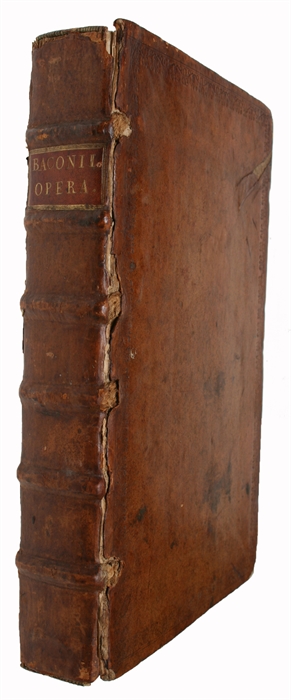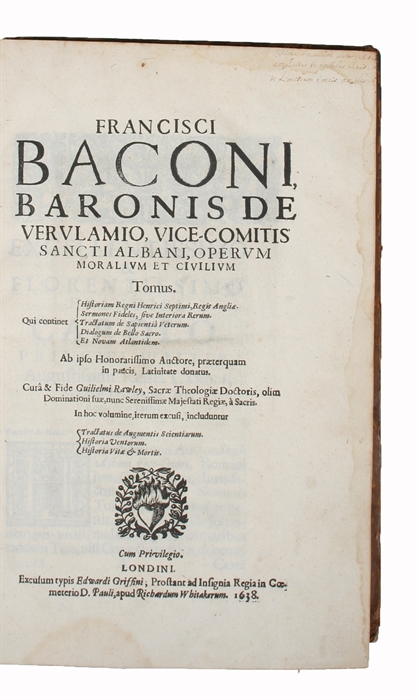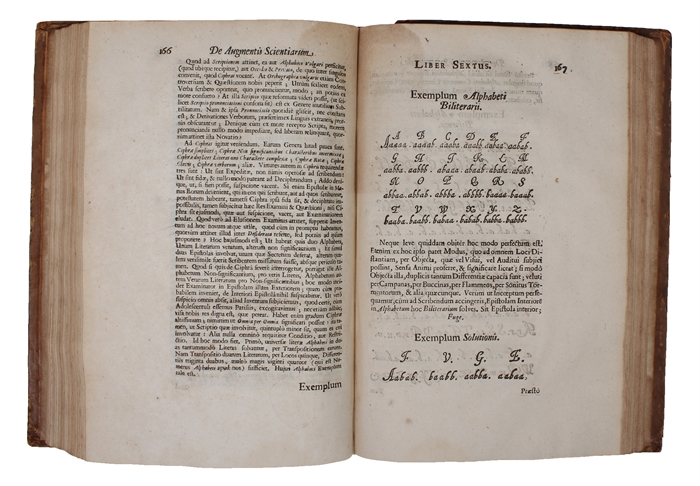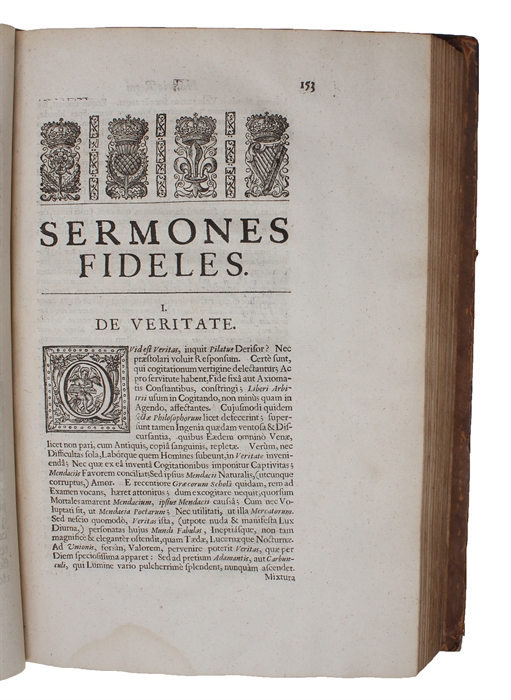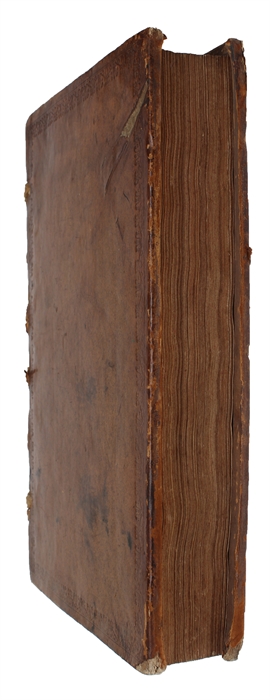LARGE-PAPER COPY - FIRST ED. IN LATIN OF "NOVA ATLANTIS" AND THE "ESSAYS"
BACON, FRANCIS.
Operum moralium et civilium....
London, Edward Griffin [John Haviland, Bernard Norton, and John Bill], Richard Whitaker [& John Norton], 1638.
Folio. (Binding: 32x22 cm, leaves: 31,1x20,8 cm.). Contemporary full speckled calf binding with six raised bands and gilt red leather title-label to spine. Boards with blindstamped ornamental border. Scuff marks to boards and hinges worn, so bands showing. Large woodcut head- and tail-pieces, initials, printer's devices, and typographical ornaments (that have been of great significance to the Baconians in their attempts to establish Bacon as the author of the works attributed to Shakespeare). Roman and Italic lettering, and some Greek. Several neat inscriptions to front free end-papers and verso of frontispiece, in Latin, Greek, English, and German, dated 1704, 1740, and 1926, the last being a presentation-inscription for the renowned German Bacon-scholar and noted Baconian George J. Pfeiffer. Neat early 18th century inscription to top of title-page. Old description of the copy (1946) neatly pasted on to inside of front board. Vague minor damp-staining to lower margin throughout, far from affecting text, and mostly barely visible. A vague minor dampstain to margins of a few leaves at the beginning, also far from affecting text. All in all a lovely, clean and crisp copy on large paper. Full page engraved frontispiece-portrait + (14), 386 (pp. 177-78 omitted in pagination); (16), 475, (1) pp. Fully complete, with separate half-titles for the different works.
Scarce first edition, first issue, on large paper - THE GREAT BOOK COLLECTOR VOLLBEHR'S COPY, GIVEN TO THE IMPORTANT BACONIAN G.J. PFEIFFER - of the monumental first collected edition of the works of Francis Bacon, containing the seminal first printing in Latin of not only his greatly influential "Nova Atlantis" ("The New Atlantis" - often referred to as "the blueprint for the founding of America"), but also his groundbreaking Essays ("Sermones Fideli") as well as his history of Henry VII ("Historiam Regni Henrici Septimi") and his Dialogue on the Holy War ("Dialogum de Bello Sacro"), published by Bacon's literary executor, his close friend William Ramsey, to whom Bacon bequeathed most of his manuscripts. This first edition of his works in Latin is of the utmost importance to Bacon-scholarship and has played a seminal role in the spreading of his works as well as the understanding of two of his greatest achievements, The Essays and The Nova Atlantis, which is usually referred to with its Latin title instead of the English.
This magnificent copy with its wide margins contains several interesting inscriptions in different languages. One of them, 19th century, in German states that "This book is to remind you of the "15th Century Plot". When, in 1926, you showed to scholars his collection of 2000 incunables. He is also known as "Otto H.F. Vollbehr., [...]" - "
Dated "N. York City 29/11 26" And in the same hand, the presentation inscription is continued: "This "little book" is being handed over in friendship to Mr. George J. Pfeiffer the famous "Bacon-scholar" in order for him to continue his fruitful studies [...]."
-THE PRESENT COPY THUS EVIDENTLY BEING THE GREAT BOOK COLLECTOR VOLLBEHR'S COPY, GIVEN TO THE IMPORTANT BACONIAN PFEIFFER.
"Vollbehr was a German industrial chemist turned book collector who at the close of World War I found himself with more assets than most. Either in his own collection or through consignment Vollbehr had control of thousands of incunabula. In 1926 Vollbehr came to the United States, bringing with him a collection of 3,000 incunabula to be exhibited at the Eucharistic Congress in Chicago. After the exhibition in Chicago, Vollbehr traveled with the collection by train to several other cities. His last stop was in Washington, and over 100 of the books were exhibited in the Great Hall of the Library of Congress. Vollbehr proposed that if a benefactor would step forward to buy the collection for an American institution for half the asking price of $1.5 million, he would donate the other half. In addition, he would include a complete copy of the Gutenberg Bible printed on vellum as one of the 3,000 incunabula.
The Gutenberg Bible which crowned Vollbehr's collection had had only three owners. The first owner was said to have been Johann Fust, who took it to Paris and sold it as a manuscript to a representative of the monks of Saint Blasius. It resided with the monks in the Black Forest until they had to move to St. Paul in Carinthia in the face of the Napoleonic army. Finally, in 1926, Otto Vollbehr purchased the three volumes from the monks for $250,000.
In December 1929, a bill was presented to Congress proposing that public funds be used to acquire the Vollbehr collection for the Library of Congress. In June 1930 Congress passed the bill and President Hoover signed it into law. Between July 15 and September 3 the Vollbehr books arrived at the Library of Congress. The Bible, one of three known perfect copies printed on vellum, is one of only a few items that are permanently on display in the Library." (from the Library of Congress web-site).
George J. Pfeiffer, Ph. D., of New York, graduate of Harvard University, and Vice-president of the Bacon Society of America, is considered one of the most important Bacon-scholars of his time. His thorough scientific studies convinced himself and many others that Bacon was in fact the author of the works attributed to Shakespeare.
With THE FIRST PRINTING IN LATIN OF "NOVA ATLANTIS", Bacon's famous theories of his masterly utopian work became widespread and hugely influential. It had originally been printed, posthumously, in English and appeared at the very end of his "Sylva Sylvarum" of 1626, where it was more or less hidden away and quite humbly presented by Rawley, who was responsible for his leftover papers. Rawley's introduction to the Latin edition of the work is quite different from that of the English edition and has had quite an impact upon the reception of the work, a work which came to inspire a totally new philosophical and political genre and which fundamentally changed the way that we view the world.
The "Nova Atlantis" occupies a unique place within the works of Bacon; among many other things, it is the only overtly fictional product of his career (if one does not, like Pheiffer, believe that he is actually the true author of the Shakespearean works). The printing of this major work in the history of man's thought is quite interesting and fairly complicated. As mentioned, it appeared at the back of the larger, and much more conform, work "Sylva Sylvarum", which was published by his secretary and friend William Rawley shortly after Bacon's death. It does not, however, seem to have much in common with the "Sylva Sylvarum", and the "New Atlantis" was not even mentioned when that work entered the Stationers' Register on July 4th, 1626.
The "Sylva Sylvarum" was being compiled during the last couple of years of Bacon's life, and there is evidence to conclude that "Nova Atlantis" was being translated into Latin at the same time, whereas it seems that the English version of it was written about a year or two earlier. Although the Latin translation was thus left lying around for quite some years before it was finally printed, perhaps due to the fact that it was an unfinished text, Bacon himself seems to have concerned himself a great deal with the Latin translation of the work (as well as the other works). The appearance of them in the "universal language" were, in the words of Bacon himself to be carried out 'for the benefit of other nations', a phrase which is paralleled in the text of "Nova Atlantis", as the father of Salomon's House remarks of his relation of the institution's working that 'I giue thee leave to Publish it; for the Good of other Nations'.
And finally does this great work appear to the benefit of all men and all nations, in the universal Latin language, when in 1638 Rawley publishes the "Operum moralium", in which his "Essays" also appear in Latin for the first time, as does the History of Henry VII, and the Dialogue on the Holy War, two other greatly important works.
The printed title of the "Operum Moralium" not only informs the reader which texts are included within the volume; Rawley also provides information on the texts themselves, dividing them into two distinct sections (with two separate title-pages). The first section consists of five translations which (apart from De sapientia) had never appeared in Latin translation before; the second section consists in the first part of the "Instauratio" (originally published in 1620). The second issue of the "Operum Moralium" furthermore has the reissued sheets of the last part of the "Novum organum".
Rawley's prefatory letter tells us quite a bit about the way that he (and Bacon himself) would like the "Nova Atlantis" to be viewed, and for the first time the work is addressed in a direct and assertive manner, bringing it forth as an important philosophical work, now for the first time properly introduced. Rawley informs the reader that Bacon began the process of translating the Essays and the Nova Atlantis, because he wished his moral and political works not to perish. He goes on to explain the importance of the moral and political works being published in the "universal" Latin and groups the texts in a new way. He now makes a new category of text for the final two works, "De bello sacro" and "Nova Atlantis", calling them 'fragmentary', as opposed to the "Worke Unfinished" that he used for the English "Now Atlantis" of 1626/7, stating that this is at the request of Bacon himself: "And finally he ordered that two fragments be added, the Dialogue of the Holy War, and the New Atlantis: but he said that these were the three kinds of fragments.", giving to them a certain status of their own and a deliberate character that they had not possessed before.
For the first time, the "Nova Atlantis", the hitherto hidden-away work that was never properly introduced, is now included in the general preface, which it was not in 1626/27, and the "Nova Atlantis" is given the central position within Bacon's works that it deserved - and that it has possessed ever since. This also explains the great impact of the first Latin version of the "Nova Atlantis" as opposed to the English version, which was far less influential.
Not only is "Nova Atlantis" no longer just an unfinished work worthy of no more than being hidden away at the back of a larger work, it is now the central part of a seminal collection of works appearing for the first time in Latin "for the Good of other Nations".
"Francis Bacon (1561-1626) was one of the leading figures in natural philosophy and in the field of scientific methodology in the period of transition from the Renaissance to the early modern era. As a lawyer, member of Parliament, and Queen's Counsel, Bacon wrote on questions of law, state and religion, as well as on contemporary politics; but he also published texts in which he speculated on possible conceptions of society, and he pondered questions of ethics (Essays) even in his works on natural philosophy (The Advancement of Learning).
After his studies at Trinity College, Cambridge and Gray's Inn, London, Bacon did not take up a post at a university, but instead tried to start a political career. Although his efforts were not crowned with success during the era of Queen Elizabeth, under James I he rose to the highest political office, Lord Chancellor. Bacon's international fame and influence spread during his last years, when he was able to focus his energies exclusively on his philosophical work, and even more so after his death, when English scientists of the Boyle circle (Invisible College) took up his idea of a cooperative research institution in their plans and preparations for establishing the Royal Society.
To the present day Bacon is well known for his treatises on empiricist natural philosophy (The Advancement of Learning, Novum Organum Scientiarum) and for his doctrine of the idols, which he put forward in his early writings, as well as for the idea of a modern research institute, which he described in Nova Atlantis." (SEP).
Gibson: 196; Lowndes I:96.
Order-nr.: 46277

